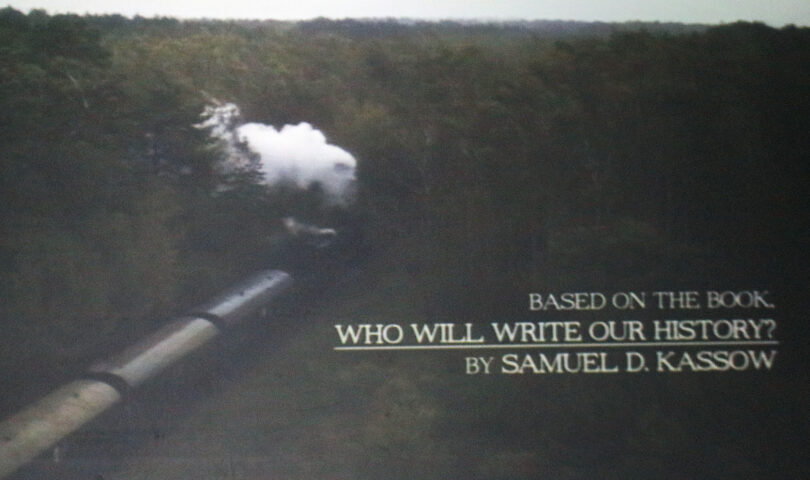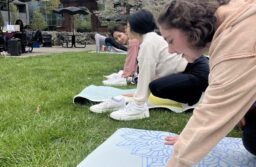The Gross Center for Holocaust and Genocide Studies hosted a screening of the film “Who Will Write our History” which examines life in the Warsaw Ghetto and the attempts of Jews to record their own history and experiences.
A discussion with director Roberta Grossman was led by Jacob Ari Labendz, professor and director of the Gross Center, after the screening on Oct. 7 for the students in his Hitler, Holocaust and Genocide course and other attendees.
The film was based off of the book of the same name by historian Samuel Kassow. It tells the story of Emanuel Ringelblum, a Jewish Polish historian and politician, and Oyneg Shabes (meaning “Joy of the Sabbath”), the group he formed to create and curate an archive of Jewish stories from inside the Warsaw Ghetto.
The story is told in a unique way through the film’s artistic style. The film is a combination of a documentary including archival footage and interviews with historians – including Kassow – and scenes from diary entries in the archive narrated and reenacted by actors. The style leads the film to be visually engaging as well, jumping from gritty black and white history to dramatic reenactments of the director’s interpretation of critical moments from the Oyneg Shabes members’ lives.
“We saw it coming. But we did not want to see the truth. We protected ourselves from the truth,” recounted Rachel Auerbach in a narration of one of her diary entries. The narration referred to the start of the suffering Jews endured in the Warsaw Ghetto, which was the bombing of Warsaw on Sept. 9, 1939 before the ghetto was constructed.
Auerbach was a Jewish journalist and arts critic who met Ringelblum on multiple occasions before becoming a member of Oyneg Shabes. She is a central focus of the film as well, since she was ultimately one of the only three members of Oyneg Shabes to survive the Holocaust.
After the German occupation began, Ringelblum started keeping a diary of the situation. He described the evolution of the conditions in the Warsaw Ghetto from Jews being moved in and Poles being transferred out, the ghetto being closed off on Nov. 15, 1940, the starvation, the poor living conditions and even the uprising he led against the Germans on the Aryan side of Warsaw. Oyneg Shabes emerged as a means of collecting the stories of Jews who were trying to preserve their stories and history.
“Will the Germans write our history or will we write our history?” the film asked.
Ringelblum also read each and every essay, diary entry and artifact that entered the archive because he wanted its contents to be used as evidence of the atrocities committed against the Jewish people. The film described the archive as “one big accusation of German policy,” meaning that Ringelblum and the members of Oyneg Shabes would be executed if they were caught for criticizing the German government.
During the discussion with Grossman, one participant asked about the film’s unique style of storytelling.
“Although things have changed in the past 10 years, people are very strict… What’s a documentary and what’s not a documentary?” she said. “And scholars of the Holocaust are very strict about how you can and can’t use because of Holocaust denial. People are concerned about any kind of what they perceive as fabrication.”
She also said she wanted to tell the story of the archive visually and give the film the gravitas of a documentary, which is why there are multiple scholarly interviews and why images of documents in the archive are often shown before a voiceover narrates them. The recreations, she said, were to have viewers relate to the characters and feel close to them “in a way that only felt cinematic in fiction.”
She was also asked about what the most important thing she wanted to accomplish was in telling this story.
“You know, I think the members of Oyneg Shabes archive had prevailing wishes in their last days and one was for the stories in the archive to be made public or known so that the story of the Jewish experience… would be told from a Jewish point of view, and the second that they would be remembered as individuals,” Grossman said. When screening this movie to audiences, she believed that she was fulfilling those wishes.
mwikfors@ramapo.edu
Photo by Matthew Wikfors.





